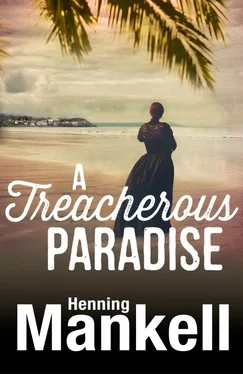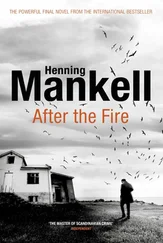In the afternoon she summoned Andrade’s car and was driven to the harbour. She had put on her best clothes, and spent an age in front of the big mirror in the hall next to the front door. On the way to the harbour she suddenly had an idea, and asked the chauffeur to make a detour and stop outside Picard’s photographic studio. Picard was a Frenchman who had established himself in Lourenço Marques as early as the beginning of the 1890s. His studio was used by the town’s wealthy inhabitants. His face had been disfigured by a shell splinter that had hit him during the Franco-Prussian War in 1870. Although his face was repugnant, his friendliness and his photographic skills endeared him to everybody. But he refused to take pictures of black people, unless they were in the role of servants or bearers, or simply made up the background behind the white people who were being portrayed.
Picard bowed and informed her that he could take her photograph immediately — a couple had just cancelled their slot because their engagement had been broken off. Hanna wanted to be photographed standing up, wearing her big hat, her long gloves, and with her furled parasol by her side.
Picard asked respectfully who the picture was for. He knew exactly who she was, and about her short marriage to Senhor Vaz. Hanna also knew that for some unknown reason Picard had always patronized a rival establishment when he made his regular brothel visits.
‘The photograph is for my mother,’ she said.
‘I see,’ said Picard. ‘So we want a dignified picture. One showing that all is well on the African continent, and that you are leading a life that has brought you success and riches.’
He placed her next to a large mirror and a chair with beautiful arms. He moved a flower arrangement standing on a small table out of the composition after having tried it but found it unsuitable. Then he took the photograph and promised to develop it immediately and make three copies. Hanna paid him twice as much as he asked for. They agreed that the black messenger boy would deliver the photographs to Captain Svartman’s ship the moment they were dry.
When she reached the harbour she found Captain Svartman standing on the gangplank, waiting for her. Hanna noted that his uniform had been newly brushed down and his peaked cap polished. She walked up the gangplank, and for a brief, dizzy moment recalled the emotions she had felt when she left the ship. Some crewmen were busy splicing ropes, others were repairing a cargo hatch. She couldn’t see anybody she recognized. The captain realized that she was looking for a familiar face.
‘The crew is completely new,’ he said. ‘After Lundmark’s death rumours started to spread suggesting that I was an unlucky captain. Peltonen’s disappearance didn’t help matters. But my new crew is very competent. As captain I can’t go around wishing that earlier crew members were back on board again. I sail with the living, not the dead.’
He took her to his cabin. On the way there she saw the new cook coming out of the galley, a young man with blond hair.
‘An Estonian,’ said the captain. ‘He usually makes pretty good food. He’s quiet and clean.’
They sat down in the cabin and were served tea by a nervous-seeming boy in a white jacket. Hanna noticed that the potted plants in the brass-framed portholes were well looked after.
‘I must know what you said to Jonathan Forsman.’
Svartman nodded. He’d been expecting that question.
‘All I could tell him were the facts as I knew them. That you had disappeared during our stop at the last port before the final lap to Australia. That we spent a whole day looking for you, but were then forced to continue our voyage. And that I didn’t know what had happened to you. Either you were alive, or you were dead: I had no idea which.’
‘What did Forsman say?’
‘He was upset. Shaking. I was afraid he might get into such a state that he had a heart attack. It wasn’t me he was directing his anger at, but Fate. The fact that you hadn’t come back. I think he felt a heavy responsibility.’
‘Do you know what he told my mother?’
The captain shook his head.
‘I assume he tried to give her courage and hope, but I suspect she must have thought that her daughter was dead and buried in a foreign country.’
Hanna felt a lump in her throat, and tears gathering behind her eyes. But she didn’t want to start crying in front of the captain. She tried to keep a firm grip on herself so as not to break down.
They drank the tea that the boy had poured into their cups, his hand trembling. Hanna recognized the crockery from her time on board.
‘This accursed continent!’ said the captain out of the blue. ‘I’m trying to understand how it’s been possible for you to live here so long.’
‘Not everything is bad,’ she said. ‘The heat can be difficult, but most of the time it’s pleasant. There’s no such thing as cold here. I’ve tried to explain to black people what snow is — like ice, but at the same time as light as a chicken feather falling down from the sky. It’s not possible to make them understand.’
‘But what about the people? The blacks? I shudder when I see how they live.’
‘I don’t know much about that. They live their own lives outside town. In the mornings they come wandering in out of the sun to work as servants or miners. Then they disappear again.’
‘I hear a lot of talk about violence and robbery. We always post extra guards by the gangplank when we are berthed in African harbours. Other captains have told me about thieves who swim to the ship and climb on board.’
‘I haven’t come across anything of that kind all the time I’ve been living here. The blacks are not like us, but I don’t know if they are dangerous. I wouldn’t have thought so.’
‘Can they be trusted?’
‘No,’ said Hanna, mostly because that was obviously what the captain wanted to hear. She suddenly realized that she simply didn’t know what she really thought.
The captain studied his hands without speaking.
‘It doesn’t happen very often,’ he said eventually. ‘My visits to those black women.’
‘Of course not,’ said Hanna. ‘I’ve already forgotten it was there we happened to meet.’
The captain seemed relieved. Hanna immediately cashed in on her reward for being so understanding.
‘I only went to the brothel to find out why the cashier hadn’t been to see me the evening before. I never go there otherwise. I do the work I need to do at a safe distance. I live in a stone-built house that is not much smaller than Jonathan Forsman’s.’
The captain nodded. Hanna could see that he was impressed by what she had to say, although he wasn’t totally convinced that it was true. We don’t trust each other, she thought. But we did when we were working together on the boat.
She suddenly had the feeling that she wanted to get away from the ship as quickly as possible. And so she put the three letters on the little table that was screwed down on to the floor.
‘Three copies of a photograph are on their way,’ she said. ‘A messenger boy will bring them to the ship shortly. I want Forsman and Berta to have a copy, and the third one should be sent to my mother.’
She opened her purse and took out several high-value Portuguese banknotes. Svartman declined to accept them. Hanna couldn’t help wondering what currency he had used to pay Felicia for her services. She felt uncomfortable when the image of the naked captain lying on top of Felicia’s attractive body appeared in her mind’s eye.
He accompanied her out on to the deck.
‘I’ll be going back to Sweden soon,’ she said. ‘Other Swedish ships call in here from time to time, but I can’t possibly leave just now. I’ve accepted responsibility for the brothel for as long as the owner is ill, so I can’t leave this town until she’s fit again.’
Читать дальше












